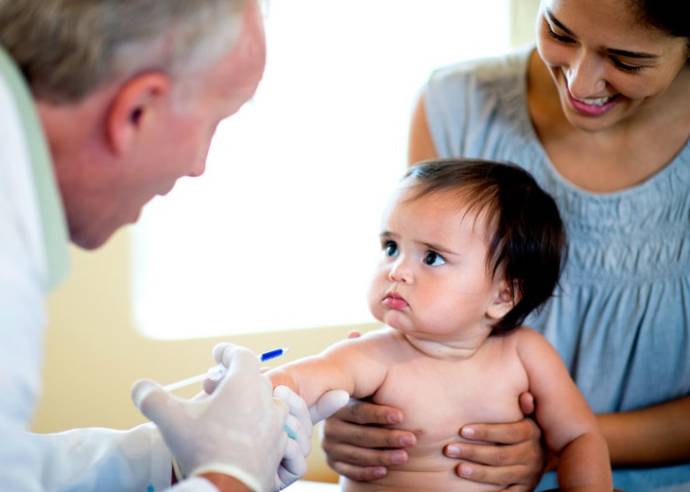There is absolutely no doubt that children are the most valuable creation for their parents. Parents prioritize their task on the basis of the schedule of their children. Also, the care, security and good health of the children are the foremost priorities of parents. However, sometimes parents face a dilemma at the time when the vaccination is due. On the one hand, they do not want their children to experience injection pain, while on the other hand, they are calculating long term positive benefits due to vaccination. However, with proper care during both pre and post vaccination, the pain and stress, in infants as well as the parents, can be minimized.
Importance of vaccination
With the emergence of resistant pathogens including bacteria, virus, and fungi, and the rising cost of treatment in almost all the therapeutic categories, vaccines have emerged as one of the most powerful tools to prevent fatal and prolonged debilitating diseases. It also helps in avoiding the misery of various diseases that would otherwise be, experienced by the children. For instance, polio, although non-fatal in most cases, causes permanent disability in children at a very young age. For the pain during injection and post-vaccination complications such as fever, development of most-modern vaccines and their administration is under constant research. Vaccinations also help children increase their immunity against various diseases and reduce their chances of getting ill. It will also help in avoiding taking breaks from his studies. It should be noted that vaccination always provides significant benefits as compared to the momentary pain and stress experienced by the child and his parents.
Pre-vaccination preparation
With the advanced facilities available at the hospital as well as due to the presence of experienced and trained medical professionals, there is practically no need to prepare the child for getting the vaccination. However, certain tips may help in making your child more comfortable at the time of getting vaccination:
- Ready with questions: You should be ready with your queries and questions regarding the vaccination and seek answers from a healthcare professional. Many vaccinations are just the marketing gimmick and may not be required by your child. So be aware of what all vaccinations your child requires.
- Be clear to the older child: Make everything clear to your child. This includes the stinging during injection and accompanying fever after vaccinations. This will help him to prepare and most importantly he will trust you more than before.
- Bring the favorites: In case of a small child or infant, do not forget to bring his favorite toys and eatables. In the case of older children, favorite books and comics may be the best option for distracting his attention from the pain during vaccination.
- Float the positives: Always make aware your child about the benefits of vaccination and the implications of not having them. It will help him to do a pain-benefit analysis.
- Bring in togetherness: Ask your family members and especially the siblings to support the child. This will help in boosting confidence and increase the power to encounter pain.
- Smile…Smile and Smile: Always smile and make eye contact with your child. This would make him feel that this is a routine and general process, and everything would be fine.
- Provide security: Hold your child on your lap firmly as far as possible. This would provide him a sense of security.
Post-vaccination care
- Keep Eye on the visible: Various changes can be seen on the tissues present at the site of injection. The parents should immediately seek medical attention in case there are constant swelling and inflammation. The doctor should also be consulted if the baby is crying continuously for more than 3 hours, there are hives and baby has a swollen abdomen with bloody stools.
- Manage heat: Fever should be monitored and if required, fever-reducing drugs can be given after consulting with a pediatrician.
- Fluid supplementation: The fluid such as water or juice should be provided as it is common for children to eat small quantity in 24 hours after vaccination.
Various vaccination and their schedule
Following is the chart of most common vaccines required along with their schedule:
- BCG: This vaccine provides immunity against tuberculosis. It should be given immediately after birth and if not possible, the vaccine must be given within 1 year of birth.
- Oral Polio Vaccine: This vaccine prevents the infection of the poliovirus. At least five doses of polio vaccine are required for complete protection. Fist dose is given at the time of birth while the next three doses are given at 6, 10 and 14 weeks after birth. A booster dose is required to be given between 16 months to 24 months.
- DPT: This vaccine protects the infant from Diphtheria, Pertussis, and Tetanus. 3 primary doses are administered at 6, 10 and 14 weeks after birth while the first and second booster dose are given between 16-24 months and 5-6 years, respectively.
- Hib: This vaccine provides protection against pneumonia and meningitis. Three doses of this vaccine are given at 6, 10 and 14 weeks after birth.
- Measles- Lyophilized: It provides security against measles. The first dose of this vaccine is given within 9 to 12 months while the second dose is given between 16 to 24 months.
- Hepatitis B: It protects from the liver infection. The first dose is given within 24 hours after birth followed by 3 doses at 6, 10 and 14 weeks after birth.
- Tetanus Toxoid: It prevents the child from contracting tetanus. The first dose is given when the child is of 10 years while the second dose is given at age 16.
- Japanese Encephalitis: It protects the child from brain fever. The first dose is given in 9 to 12 months while the second dose is given at 16-24 months.
Conclusion
Vaccination is an important part of child caring. Maintaining a proper vaccination schedule prevents your child from getting serious diseases. Further, it should be noted that the benefits of vaccination are far more as compared to pain and stress experienced.





